Unit 2 Home Sweet Home Section A 知识点精讲精练(含答案)人教版(2024)版八年级英语上册
文档属性
| 名称 | Unit 2 Home Sweet Home Section A 知识点精讲精练(含答案)人教版(2024)版八年级英语上册 | 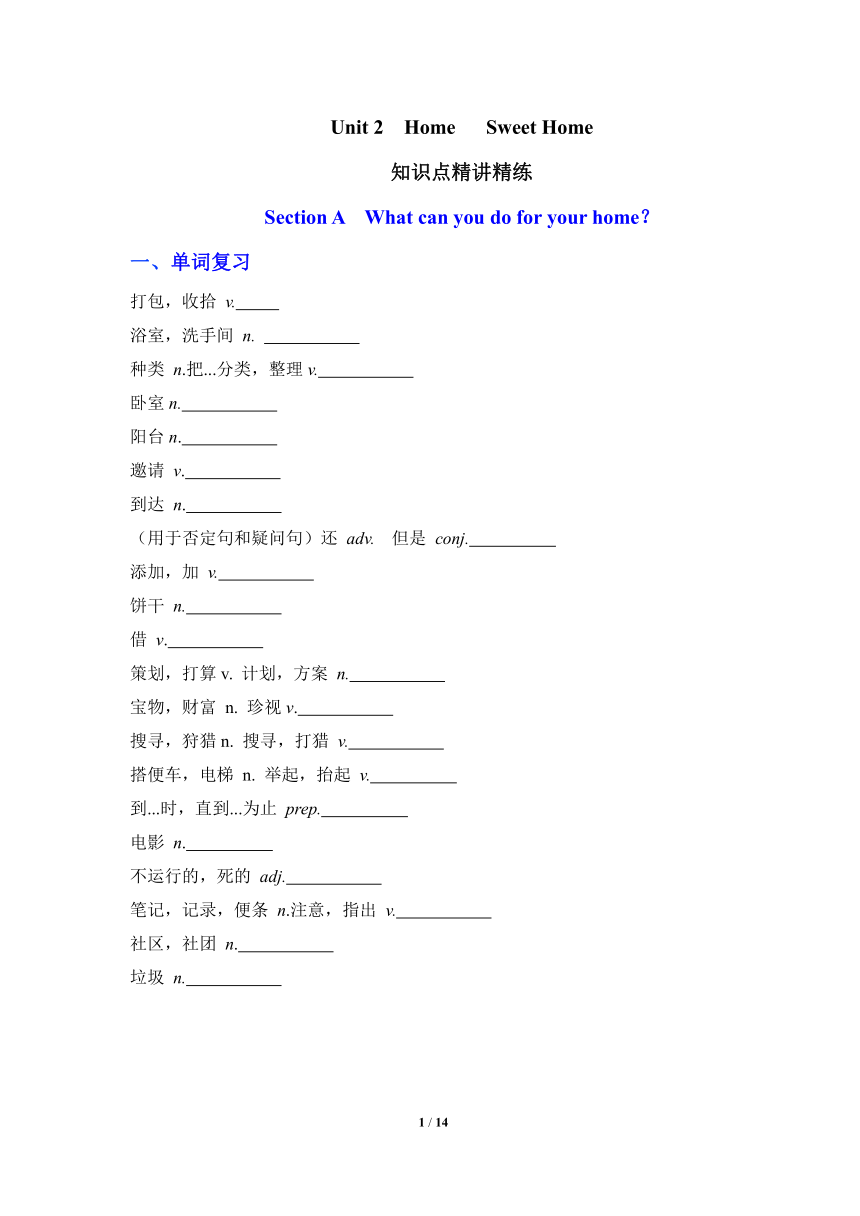 | |
| 格式 | doc | ||
| 文件大小 | 114.5KB | ||
| 资源类型 | 教案 | ||
| 版本资源 | 人教版 | ||
| 科目 | 英语 | ||
| 更新时间 | 2025-08-05 13:17:39 | ||
图片预览

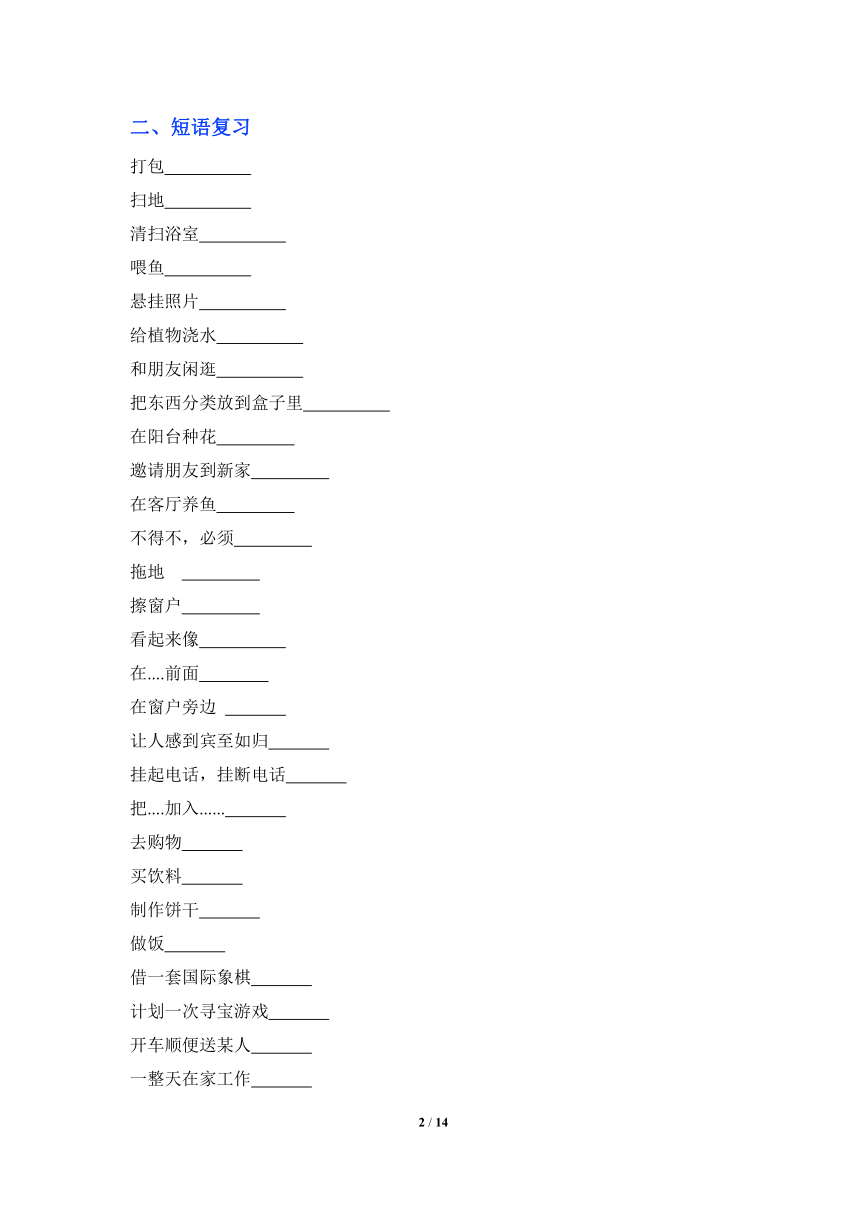
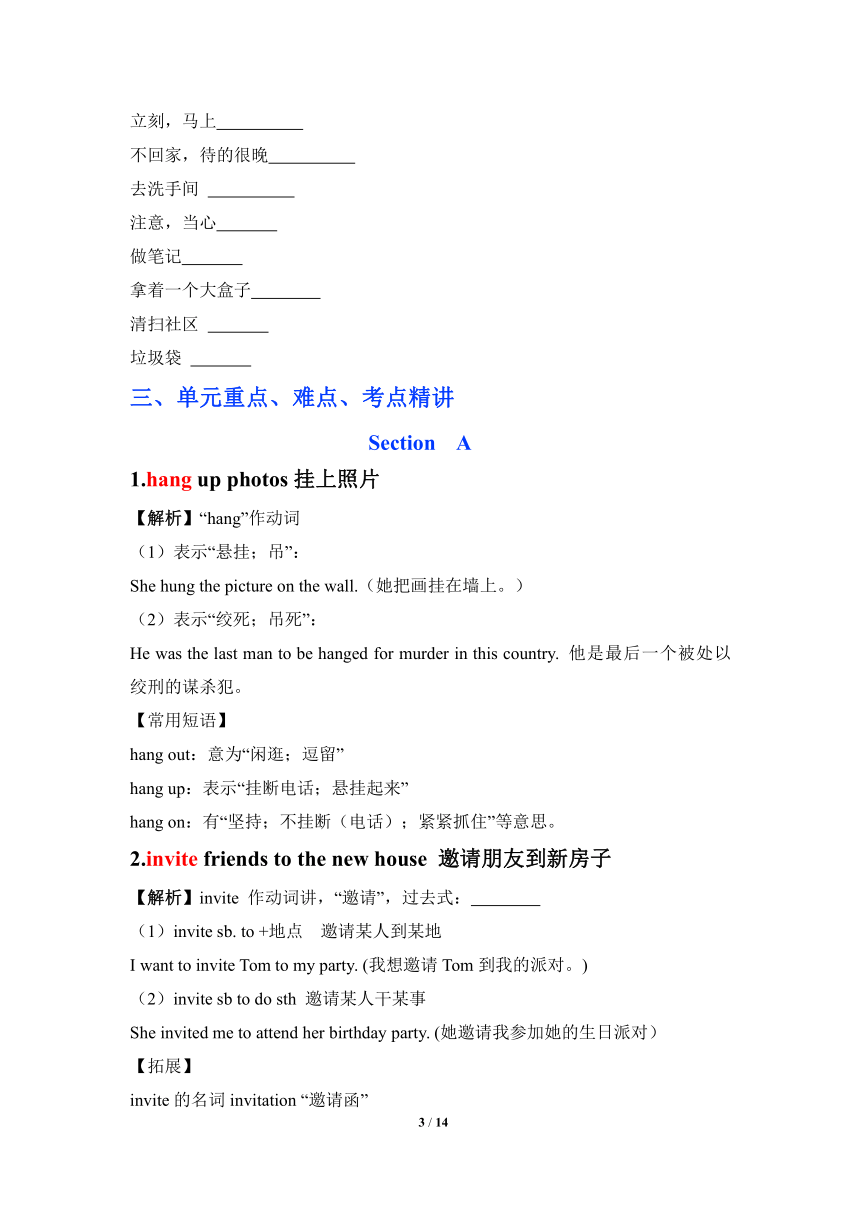
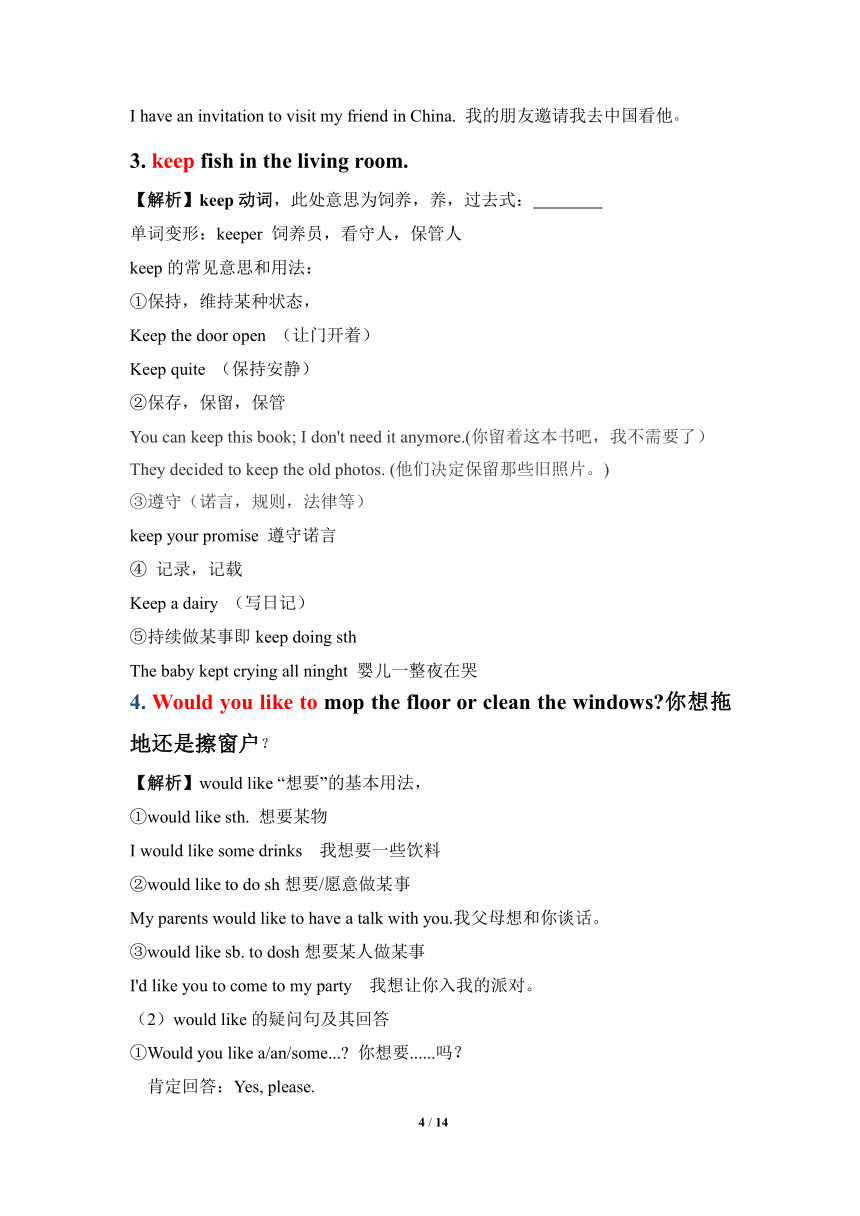
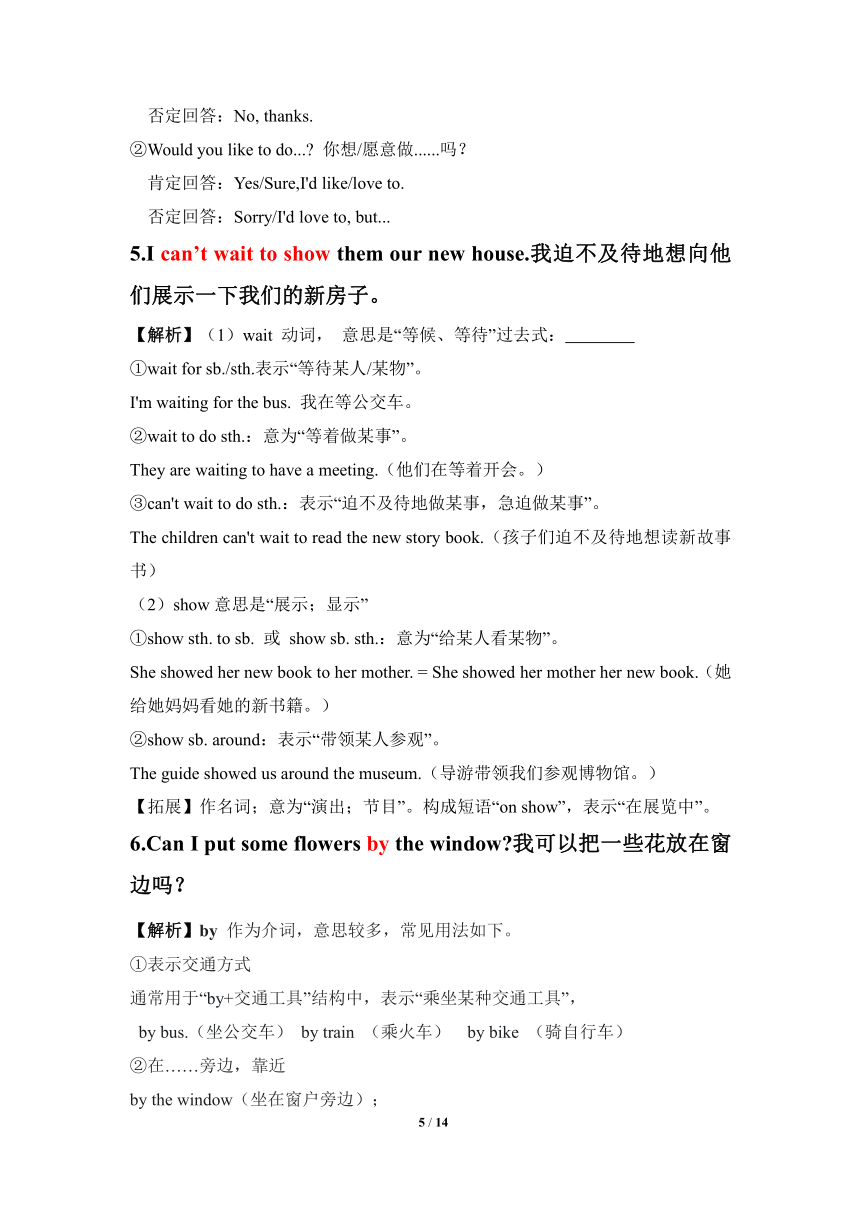
文档简介
Unit 2 Home Sweet Home
知识点精讲精练
Section A What can you do for your home?
一、单词复习
打包,收拾 v.
浴室,洗手间 n.
种类 n.把...分类,整理v.
卧室n.
阳台n.
邀请 v.
到达 n.
(用于否定句和疑问句)还 adv. 但是 conj.
添加,加 v.
饼干 n.
借 v.
策划,打算v. 计划,方案 n.
宝物,财富 n. 珍视v.
搜寻,狩猎n. 搜寻,打猎 v.
搭便车,电梯 n. 举起,抬起 v.
到...时,直到...为止 prep.
电影 n.
不运行的,死的 adj.
笔记,记录,便条 n.注意,指出 v.
社区,社团 n.
垃圾 n.
二、短语复习
打包
扫地
清扫浴室
喂鱼
悬挂照片
给植物浇水
和朋友闲逛
把东西分类放到盒子里
在阳台种花
邀请朋友到新家
在客厅养鱼
不得不,必须
拖地
擦窗户
看起来像
在....前面
在窗户旁边
让人感到宾至如归
挂起电话,挂断电话
把....加入......
去购物
买饮料
制作饼干
做饭
借一套国际象棋
计划一次寻宝游戏
开车顺便送某人
一整天在家工作
立刻,马上
不回家,待的很晚
去洗手间
注意,当心
做笔记
拿着一个大盒子
清扫社区
垃圾袋
三、单元重点、难点、考点精讲
Section A
1.hang up photos挂上照片
【解析】“hang”作动词
(1)表示“悬挂;吊”:
She hung the picture on the wall.(她把画挂在墙上。)
表示“绞死;吊死”:
He was the last man to be hanged for murder in this country. 他是最后一个被处以绞刑的谋杀犯。
【常用短语】
hang out:意为“闲逛;逗留”
hang up:表示“挂断电话;悬挂起来”
hang on:有“坚持;不挂断(电话);紧紧抓住”等意思。
2.invite friends to the new house 邀请朋友到新房子
【解析】invite 作动词讲,“邀请”,过去式:
invite sb. to +地点 邀请某人到某地
I want to invite Tom to my party. (我想邀请Tom到我的派对。)
(2)invite sb to do sth 邀请某人干某事
She invited me to attend her birthday party. (她邀请我参加她的生日派对)
【拓展】
invite的名词invitation “邀请函”
I have an invitation to visit my friend in China. 我的朋友邀请我去中国看他。
3. keep fish in the living room.
【解析】keep动词,此处意思为饲养,养,过去式:
单词变形:keeper 饲养员,看守人,保管人
keep的常见意思和用法:
①保持,维持某种状态,
Keep the door open (让门开着)
Keep quite (保持安静)
②保存,保留,保管
You can keep this book; I don't need it anymore.(你留着这本书吧,我不需要了)
They decided to keep the old photos. (他们决定保留那些旧照片。)
③遵守(诺言,规则,法律等)
keep your promise 遵守诺言
④ 记录,记载
Keep a dairy (写日记)
⑤持续做某事即keep doing sth
The baby kept crying all ninght 婴儿一整夜在哭
4. Would you like to mop the floor or clean the windows 你想拖地还是擦窗户?
【解析】would like “想要”的基本用法,
①would like sth. 想要某物
I would like some drinks 我想要一些饮料
②would like to do sh想要/愿意做某事
My parents would like to have a talk with you.我父母想和你谈话。
③would like sb. to dosh想要某人做某事
I'd like you to come to my party 我想让你入我的派对。
(2)would like的疑问句及其回答
①Would you like a/an/some... 你想要......吗?
肯定回答:Yes, please.
否定回答:No, thanks.
②Would you like to do... 你想/愿意做......吗?
肯定回答:Yes/Sure,I'd like/love to.
否定回答:Sorry/I'd love to, but...
5.I can’t wait to show them our new house.我迫不及待地想向他们展示一下我们的新房子。
【解析】(1)wait 动词, 意思是“等候、等待”过去式:
①wait for sb./sth.表示“等待某人/某物”。
I'm waiting for the bus. 我在等公交车。
②wait to do sth.:意为“等着做某事”。
They are waiting to have a meeting.(他们在等着开会。)
③can't wait to do sth.:表示“迫不及待地做某事,急迫做某事”。
The children can't wait to read the new story book.(孩子们迫不及待地想读新故事书)
(2)show意思是“展示;显示”
①show sth. to sb. 或 show sb. sth.:意为“给某人看某物”。
She showed her new book to her mother. = She showed her mother her new book.(她给她妈妈看她的新书籍。)
②show sb. around:表示“带领某人参观”。
The guide showed us around the museum.(导游带领我们参观博物馆。)
【拓展】作名词;意为“演出;节目”。构成短语“on show”,表示“在展览中”。
6.Can I put some flowers by the window 我可以把一些花放在窗边吗?
【解析】by 作为介词,意思较多,常见用法如下。
①表示交通方式
通常用于“by+交通工具”结构中,表示“乘坐某种交通工具”,
by bus.(坐公交车) by train (乘火车) by bike (骑自行车)
②在……旁边,靠近
by the window(坐在窗户旁边);
Come and sit by me. (过来做我旁边)
③表示方式、手段;意为“通过;靠;用”,后接名词、代词或动名词。
I learn English by listening to English songs.(我通过听英文歌学习英语。)
④不迟于,在....之前
Can you finish the work by five o’clock 你能五点前完成这个工作吗?
7.make grandparents feel at home让祖父母感到宾至如归
【解析】make sb feel at home让某人感到宾至如归
【拓展】make 过去式:
主要用法如下:
①make + 宾语 + 形容词:意为“使……处于某种状态”。
The news made her happy.(这个消息使她很高兴。)
②make + 宾语 + 省略to的不定式:表示“使某人做某事”,即make sb.do sth
My mother makes me clean up the room .(我妈妈让我打扫房间。)
③表示“制作;制造”
The workers make cars in the factory.(工人们在工厂制造汽车
【固定搭配】
make a decision:意为“做决定”
make friends (with):表示“(和……)交朋友”
make mistakes:意为“犯错误”。
make up:有“编造;组成;化妆”等意思。
add things to their room 给他们房间添加物品
【解析】过去式:
add“添加;增加”,常与介词to搭配,构成“add...to...”结构,
意为“把……加到……上”。
Add more sugar to the coffee.(在咖啡里再加些糖。)
【固定搭配】
①“add up”表示“把……加起来”。
Add up all the numbers and tell me the result.(把所有的数字加起来,然后告诉我结果。)
②“add up to”意为“总计达;总共是”。
The bills add up to $1000.(这些账单总计达1000美元。)
go shopping意为“去购物;去买东西”,同义短语为do some shopping.
【拓展】:“go+doing”形式表示“去做某事”,常用于表达从事某一体育活动或休闲活动。
go skating 去滑冰 go hiking 去远足
go sightseeing 去观光 go fishing 去钓鱼
go swimming 去游泳 go boating 去划船
plan a treasure hunt策划一次寻宝活动游戏
【解析】
plan作动词讲;过去式:
计划,规划(后接不定式或名词)即plan to do sth
We are planning to visit the museum next weekend. (我们计划下周末去参观博物馆。)
plan作名词讲;计划make a plan 制定计划
Helen, can I borrow your chess set 海伦,我可以借用你的棋盘吗?
【解析】borrow动词:借入,过去式:
【辨析】borrow, lend和keep的区别:
borrow, lend和keep都与“借”有关,但在用法上有区别:
①borrow:意为“借入”,表示从别人那里借来东西,常用搭配为“borrow sth. from sb.”。
He borrowed a story book from the library last week.(从图书馆借了一本书。)
②lend:意为“借出”,过去式: ,意思是把自己的东西借给别人,常用搭配为“lend sth. to sb.”或“lend sb. sth.”。
He lent his book to me. = He lent me his book.(他把自行车借给了我。)
③keep:意为“保存;保留”,过去式: 意思是表示借东西的时间长度,常与一段时间连用。
You can keep the book for two weeks.(这本书你可以借两周。)
12. Sorry, but I have to work from home all day. 我得一整天在家工作 。
【解析】have to与must的区分
have to 不得不,必须 后接动词原形,由于客观因素不得不做的事情,强调客观需要。
His home is far from school,so he has to eat lunch at school.
must 后接动词原形,主观上认为有义务或者责任做某事,强调说话人的主观看法。
Everyone must obey the traffic rules(每个人要遵守交通规则)
13.Can I stay out until eleven 我可以在外面待到十一点吗?
【解析】until(后接时间点或从句) 直到……为止
作为介词;表示“直到……为止”,后接时间点。
He waited until 6 o'clock in the .(他一直等到6点。)
(2)作连词
①引导时间状语从句,从句中的动词如果是短暂性动词,要用否定形式,即“not...until...”,表示“直到……才……”。
He didn't leave until his father came back.(直到爸爸回来,他才离开。)
②若从句中的动词是延续性动词,则用肯定形式,此时until表示“直到……为止”。
I will stay here until you come back.(我会一直待在这里,直到你回来。)
You are holding a large box.你手里拿着一个大箱子。
【解析】hold为动词,过去式: ,常见意思如下:
①“拿着;握住
The teacher is holding the book .(拿着一本书。)
②意为“举办;举行”
We held a sports meeting last week.(我们上周将举办一场运动会。)
③表示“容纳;包含”
This box can hold many things.(这个盒子能容纳很多东西。)
It is difficulty to open the door. 很难开门
【解析】句型:It is +adj(形容词)for sb. to do sth 对某人来说,做某事是.....
It 为形式主语,真正的主语为后面的不定式,for sb.根据句意,有时候可省略。
It is easy for Mary to finish the work.对玛丽来说,完成这项工作很容易。
It is important for students to practice. 对学生来说,练习很重要。
Ask your classmates to bring gloves and rubbish bags.请同学们带手套和垃圾袋。
【解析1】
①ask“询问;打听”可接双宾语,即“ask sb. sth.”,问某人某东西。
She asked him a question.(她问了他一个问题。)
②ask意为“请求;要求”,用于“ask sb. to do sth.”结构,意为“要求某人做某事”,其否定形式是ask sb not to do sth(要求某人不要做某事)。
My mother asks me to sweep the floor.(我妈妈要求我打扫我的房间。)
③“ask for”表示“请求;要求得到”He asked for help.(他请求帮助。)
ask sb for sth 向某人要求某物 He asked his mother for money.(向母亲要钱)
【解析2】bring 带来,拿来 过去式: ,把某物或者某人带到说话人所在的地方
Can you bring me a glass of water 能给我拿杯水吗?
过关检测(Section A)
单项选择
1. Could you please ____ your room My friends are coming tonight.
A. clean B. cleans C. cleaning D. to clean
2. —Could I ____ some money I want to buy some food.
—Certainly! Here you are.
A. borrow B. lend C. keep D. buy
3. The ______ of my grandparents made the whole family excited.
A. journey B. arrival C. budget D. treasure
4. I invited him ____ our school last year.
A. to visit B. visited C. visiting D. visits
5.Could you ______ the rubbish when you go out It’s getting smelly.
A. take out B. hang up C. pack up D. clean up
6.My dad tells me not to ________ too late in the evening. He says it is dangerous.
A. stay out B. grow up C. come out D. get up
7. —May I use your computer this afternoon
—____.
A. It’s a pity. B. Not at all C. No problem D. Not too bad.
8.He didn’t feel very well yesterday, so mother told him ______a rest.
A. had B. has C. to have D. having
填写单词
1 根据汉字填写单词
(1)I need to _____(分类)toys into different boxes before the move.
(2)He _____(装箱,收拾行李)a bag with a few thing yesterday
(3)Could I _____(添加)your name to the list(名单)
(4)His grandmother was _____(死亡的),and she died in 1990.
(5)Be _____(小心的) with your finger while using a knife.
2 用单词适当形式填空
We are _____(plan) a trip to France in Summer.
She is still _____(hunt) for a new job.
We are sorry for the late _____ (arrive) of the train.
It is not _____ (easily) for him to finish the job by himself.
They __________(邀请) us to their new house last weekend.
三 完型填空
A factory began to make a new kind of dog food. A big party was held to___1 the new dog food to everyone. People 2 the newspapers and TV stations were there.
There was a dog 3 the party. He would 4 the dog food and have his pictures taken. The plan was to show everybody 5 the dog would like the new dog food.
When the time 6 ,a plate of the dog food was given in front of 7 . Everyone looked at the dog. But there was one 8 . He didn't eat any of it. The dog didn't like the dog food!
The boss(老板)of the factory had to do 9 quickly. All of the people were watching. All of the people were 10 . So he ate the dog food himself.
( )1. A. send B. show C. put
( )2. A. of B. from C. in
( )3. A. by B. of C. at
( )4. A. eat B.. eating C. to eat
( )5. A. how long B. how many C. how much
( )6. A. left B. passed C. came
( )7. A. everyone B. the dog C. the boss
( )8. A. problem B. answer C. word
( )9. A. something B. anything C. nothing
( )10. A. smiling B. dancing C. laughing
四、阅读理解
Sam hated doing chores. And he had many chores. For example, on Mondays, Wednesdays and Fridays he took out the trash. And on weekends he always washed his father’s car. He also cleaned his own room once a week. What a chore that was! Sometimes he even had to look after his little sister and brother.
Sam had a foreign friend at school. His name was Kumar. Doing chores in Kumar’s family was very different. In the house only the girls did chores. His sisters made all the beds and cleaned all the rooms too, even his bedroom. His mother always cooked the meals, and his sisters helped her to go shopping, and prepare the food. They worked hard at home, doing all the chores with their mother. So when Kumar talked to his friend Sam about chores, he felt very lucky.
One day, Sam had an idea. He asked Kumar, “Could I borrow your sisters ” He wanted them to help him clean his room, but they said “no”. Instead (相反), they asked Sam to teach their brother how to do chores, so he could make his own(自己的) bed.
Sam and Kumar are very good at science. They are going to be scientists after university. They want to make a robot (机器人) to do the chores. Then everyone—mothers and fathers, sons and daughters—will be happy!
1. Which of the following is right
A. Sam liked doing chores.
B. Sam did chores only on weekends.
C. Sam liked doing chores only on weekends.
D. Sam really didn’t like doing chores.
2. Which of the following is right
A. Sam cleaned his room once a month.
B. Sam never looked after his brother and sister.
C. Sam washed the car every weekend.
D. Sam enjoyed cleaning his own room.
3. Which of the following is right
A. Everyone did chores in Kumar’s family.
B. Kumar’s sisters made his bed.
C. Kumar did some chores.
D. Kumar’s sisters liked helping their brother.
4. Which of the following is right
A. The sisters agreed to help him.
B. Sam wanted to borrow Kumar's sisters.
C. The sisters didn't want Kumar to do chores at home.
D. The sisters asked Sam to do chores for them.
5. Which of the following is right
A. Sam and Kumar plan to make a robot.
B. They aren’t going to be scientists after university.
C. No one will be happy to have a chore robot.
D. Sam and Kumar want to become robot scientists.
过关检测(Section A)答案
一 单项选择题
A 2.A 3.B 4.A 5.A 6.A. 7.C 8.C
二 单词填空题
1 sort 2 packed 3 add 4 dead 5 careful
1 planning 2 hunting 3 arrival 4 easy 5 invited
三 完型填空题
B 2. B 3.C 4.A 5. C 6.C 7.B 8. A 9.A 10 .C
四 阅读理解
1. D 从Sam hated doing chores.可知选D。
2. C 从And on weekends he always washed his father’s car.可知选C。
3. B 从His sisters made all the beds and cleaned all the rooms too, even his bedroom.可知选B。
4. B 从He asked Kumar, “Could I borrow your sisters ”可知选B。
5. A 从They want to make a robot(机器人) to do the chores.可知选A。
1 / 11
知识点精讲精练
Section A What can you do for your home?
一、单词复习
打包,收拾 v.
浴室,洗手间 n.
种类 n.把...分类,整理v.
卧室n.
阳台n.
邀请 v.
到达 n.
(用于否定句和疑问句)还 adv. 但是 conj.
添加,加 v.
饼干 n.
借 v.
策划,打算v. 计划,方案 n.
宝物,财富 n. 珍视v.
搜寻,狩猎n. 搜寻,打猎 v.
搭便车,电梯 n. 举起,抬起 v.
到...时,直到...为止 prep.
电影 n.
不运行的,死的 adj.
笔记,记录,便条 n.注意,指出 v.
社区,社团 n.
垃圾 n.
二、短语复习
打包
扫地
清扫浴室
喂鱼
悬挂照片
给植物浇水
和朋友闲逛
把东西分类放到盒子里
在阳台种花
邀请朋友到新家
在客厅养鱼
不得不,必须
拖地
擦窗户
看起来像
在....前面
在窗户旁边
让人感到宾至如归
挂起电话,挂断电话
把....加入......
去购物
买饮料
制作饼干
做饭
借一套国际象棋
计划一次寻宝游戏
开车顺便送某人
一整天在家工作
立刻,马上
不回家,待的很晚
去洗手间
注意,当心
做笔记
拿着一个大盒子
清扫社区
垃圾袋
三、单元重点、难点、考点精讲
Section A
1.hang up photos挂上照片
【解析】“hang”作动词
(1)表示“悬挂;吊”:
She hung the picture on the wall.(她把画挂在墙上。)
表示“绞死;吊死”:
He was the last man to be hanged for murder in this country. 他是最后一个被处以绞刑的谋杀犯。
【常用短语】
hang out:意为“闲逛;逗留”
hang up:表示“挂断电话;悬挂起来”
hang on:有“坚持;不挂断(电话);紧紧抓住”等意思。
2.invite friends to the new house 邀请朋友到新房子
【解析】invite 作动词讲,“邀请”,过去式:
invite sb. to +地点 邀请某人到某地
I want to invite Tom to my party. (我想邀请Tom到我的派对。)
(2)invite sb to do sth 邀请某人干某事
She invited me to attend her birthday party. (她邀请我参加她的生日派对)
【拓展】
invite的名词invitation “邀请函”
I have an invitation to visit my friend in China. 我的朋友邀请我去中国看他。
3. keep fish in the living room.
【解析】keep动词,此处意思为饲养,养,过去式:
单词变形:keeper 饲养员,看守人,保管人
keep的常见意思和用法:
①保持,维持某种状态,
Keep the door open (让门开着)
Keep quite (保持安静)
②保存,保留,保管
You can keep this book; I don't need it anymore.(你留着这本书吧,我不需要了)
They decided to keep the old photos. (他们决定保留那些旧照片。)
③遵守(诺言,规则,法律等)
keep your promise 遵守诺言
④ 记录,记载
Keep a dairy (写日记)
⑤持续做某事即keep doing sth
The baby kept crying all ninght 婴儿一整夜在哭
4. Would you like to mop the floor or clean the windows 你想拖地还是擦窗户?
【解析】would like “想要”的基本用法,
①would like sth. 想要某物
I would like some drinks 我想要一些饮料
②would like to do sh想要/愿意做某事
My parents would like to have a talk with you.我父母想和你谈话。
③would like sb. to dosh想要某人做某事
I'd like you to come to my party 我想让你入我的派对。
(2)would like的疑问句及其回答
①Would you like a/an/some... 你想要......吗?
肯定回答:Yes, please.
否定回答:No, thanks.
②Would you like to do... 你想/愿意做......吗?
肯定回答:Yes/Sure,I'd like/love to.
否定回答:Sorry/I'd love to, but...
5.I can’t wait to show them our new house.我迫不及待地想向他们展示一下我们的新房子。
【解析】(1)wait 动词, 意思是“等候、等待”过去式:
①wait for sb./sth.表示“等待某人/某物”。
I'm waiting for the bus. 我在等公交车。
②wait to do sth.:意为“等着做某事”。
They are waiting to have a meeting.(他们在等着开会。)
③can't wait to do sth.:表示“迫不及待地做某事,急迫做某事”。
The children can't wait to read the new story book.(孩子们迫不及待地想读新故事书)
(2)show意思是“展示;显示”
①show sth. to sb. 或 show sb. sth.:意为“给某人看某物”。
She showed her new book to her mother. = She showed her mother her new book.(她给她妈妈看她的新书籍。)
②show sb. around:表示“带领某人参观”。
The guide showed us around the museum.(导游带领我们参观博物馆。)
【拓展】作名词;意为“演出;节目”。构成短语“on show”,表示“在展览中”。
6.Can I put some flowers by the window 我可以把一些花放在窗边吗?
【解析】by 作为介词,意思较多,常见用法如下。
①表示交通方式
通常用于“by+交通工具”结构中,表示“乘坐某种交通工具”,
by bus.(坐公交车) by train (乘火车) by bike (骑自行车)
②在……旁边,靠近
by the window(坐在窗户旁边);
Come and sit by me. (过来做我旁边)
③表示方式、手段;意为“通过;靠;用”,后接名词、代词或动名词。
I learn English by listening to English songs.(我通过听英文歌学习英语。)
④不迟于,在....之前
Can you finish the work by five o’clock 你能五点前完成这个工作吗?
7.make grandparents feel at home让祖父母感到宾至如归
【解析】make sb feel at home让某人感到宾至如归
【拓展】make 过去式:
主要用法如下:
①make + 宾语 + 形容词:意为“使……处于某种状态”。
The news made her happy.(这个消息使她很高兴。)
②make + 宾语 + 省略to的不定式:表示“使某人做某事”,即make sb.do sth
My mother makes me clean up the room .(我妈妈让我打扫房间。)
③表示“制作;制造”
The workers make cars in the factory.(工人们在工厂制造汽车
【固定搭配】
make a decision:意为“做决定”
make friends (with):表示“(和……)交朋友”
make mistakes:意为“犯错误”。
make up:有“编造;组成;化妆”等意思。
add things to their room 给他们房间添加物品
【解析】过去式:
add“添加;增加”,常与介词to搭配,构成“add...to...”结构,
意为“把……加到……上”。
Add more sugar to the coffee.(在咖啡里再加些糖。)
【固定搭配】
①“add up”表示“把……加起来”。
Add up all the numbers and tell me the result.(把所有的数字加起来,然后告诉我结果。)
②“add up to”意为“总计达;总共是”。
The bills add up to $1000.(这些账单总计达1000美元。)
go shopping意为“去购物;去买东西”,同义短语为do some shopping.
【拓展】:“go+doing”形式表示“去做某事”,常用于表达从事某一体育活动或休闲活动。
go skating 去滑冰 go hiking 去远足
go sightseeing 去观光 go fishing 去钓鱼
go swimming 去游泳 go boating 去划船
plan a treasure hunt策划一次寻宝活动游戏
【解析】
plan作动词讲;过去式:
计划,规划(后接不定式或名词)即plan to do sth
We are planning to visit the museum next weekend. (我们计划下周末去参观博物馆。)
plan作名词讲;计划make a plan 制定计划
Helen, can I borrow your chess set 海伦,我可以借用你的棋盘吗?
【解析】borrow动词:借入,过去式:
【辨析】borrow, lend和keep的区别:
borrow, lend和keep都与“借”有关,但在用法上有区别:
①borrow:意为“借入”,表示从别人那里借来东西,常用搭配为“borrow sth. from sb.”。
He borrowed a story book from the library last week.(从图书馆借了一本书。)
②lend:意为“借出”,过去式: ,意思是把自己的东西借给别人,常用搭配为“lend sth. to sb.”或“lend sb. sth.”。
He lent his book to me. = He lent me his book.(他把自行车借给了我。)
③keep:意为“保存;保留”,过去式: 意思是表示借东西的时间长度,常与一段时间连用。
You can keep the book for two weeks.(这本书你可以借两周。)
12. Sorry, but I have to work from home all day. 我得一整天在家工作 。
【解析】have to与must的区分
have to 不得不,必须 后接动词原形,由于客观因素不得不做的事情,强调客观需要。
His home is far from school,so he has to eat lunch at school.
must 后接动词原形,主观上认为有义务或者责任做某事,强调说话人的主观看法。
Everyone must obey the traffic rules(每个人要遵守交通规则)
13.Can I stay out until eleven 我可以在外面待到十一点吗?
【解析】until(后接时间点或从句) 直到……为止
作为介词;表示“直到……为止”,后接时间点。
He waited until 6 o'clock in the .(他一直等到6点。)
(2)作连词
①引导时间状语从句,从句中的动词如果是短暂性动词,要用否定形式,即“not...until...”,表示“直到……才……”。
He didn't leave until his father came back.(直到爸爸回来,他才离开。)
②若从句中的动词是延续性动词,则用肯定形式,此时until表示“直到……为止”。
I will stay here until you come back.(我会一直待在这里,直到你回来。)
You are holding a large box.你手里拿着一个大箱子。
【解析】hold为动词,过去式: ,常见意思如下:
①“拿着;握住
The teacher is holding the book .(拿着一本书。)
②意为“举办;举行”
We held a sports meeting last week.(我们上周将举办一场运动会。)
③表示“容纳;包含”
This box can hold many things.(这个盒子能容纳很多东西。)
It is difficulty to open the door. 很难开门
【解析】句型:It is +adj(形容词)for sb. to do sth 对某人来说,做某事是.....
It 为形式主语,真正的主语为后面的不定式,for sb.根据句意,有时候可省略。
It is easy for Mary to finish the work.对玛丽来说,完成这项工作很容易。
It is important for students to practice. 对学生来说,练习很重要。
Ask your classmates to bring gloves and rubbish bags.请同学们带手套和垃圾袋。
【解析1】
①ask“询问;打听”可接双宾语,即“ask sb. sth.”,问某人某东西。
She asked him a question.(她问了他一个问题。)
②ask意为“请求;要求”,用于“ask sb. to do sth.”结构,意为“要求某人做某事”,其否定形式是ask sb not to do sth(要求某人不要做某事)。
My mother asks me to sweep the floor.(我妈妈要求我打扫我的房间。)
③“ask for”表示“请求;要求得到”He asked for help.(他请求帮助。)
ask sb for sth 向某人要求某物 He asked his mother for money.(向母亲要钱)
【解析2】bring 带来,拿来 过去式: ,把某物或者某人带到说话人所在的地方
Can you bring me a glass of water 能给我拿杯水吗?
过关检测(Section A)
单项选择
1. Could you please ____ your room My friends are coming tonight.
A. clean B. cleans C. cleaning D. to clean
2. —Could I ____ some money I want to buy some food.
—Certainly! Here you are.
A. borrow B. lend C. keep D. buy
3. The ______ of my grandparents made the whole family excited.
A. journey B. arrival C. budget D. treasure
4. I invited him ____ our school last year.
A. to visit B. visited C. visiting D. visits
5.Could you ______ the rubbish when you go out It’s getting smelly.
A. take out B. hang up C. pack up D. clean up
6.My dad tells me not to ________ too late in the evening. He says it is dangerous.
A. stay out B. grow up C. come out D. get up
7. —May I use your computer this afternoon
—____.
A. It’s a pity. B. Not at all C. No problem D. Not too bad.
8.He didn’t feel very well yesterday, so mother told him ______a rest.
A. had B. has C. to have D. having
填写单词
1 根据汉字填写单词
(1)I need to _____(分类)toys into different boxes before the move.
(2)He _____(装箱,收拾行李)a bag with a few thing yesterday
(3)Could I _____(添加)your name to the list(名单)
(4)His grandmother was _____(死亡的),and she died in 1990.
(5)Be _____(小心的) with your finger while using a knife.
2 用单词适当形式填空
We are _____(plan) a trip to France in Summer.
She is still _____(hunt) for a new job.
We are sorry for the late _____ (arrive) of the train.
It is not _____ (easily) for him to finish the job by himself.
They __________(邀请) us to their new house last weekend.
三 完型填空
A factory began to make a new kind of dog food. A big party was held to___1 the new dog food to everyone. People 2 the newspapers and TV stations were there.
There was a dog 3 the party. He would 4 the dog food and have his pictures taken. The plan was to show everybody 5 the dog would like the new dog food.
When the time 6 ,a plate of the dog food was given in front of 7 . Everyone looked at the dog. But there was one 8 . He didn't eat any of it. The dog didn't like the dog food!
The boss(老板)of the factory had to do 9 quickly. All of the people were watching. All of the people were 10 . So he ate the dog food himself.
( )1. A. send B. show C. put
( )2. A. of B. from C. in
( )3. A. by B. of C. at
( )4. A. eat B.. eating C. to eat
( )5. A. how long B. how many C. how much
( )6. A. left B. passed C. came
( )7. A. everyone B. the dog C. the boss
( )8. A. problem B. answer C. word
( )9. A. something B. anything C. nothing
( )10. A. smiling B. dancing C. laughing
四、阅读理解
Sam hated doing chores. And he had many chores. For example, on Mondays, Wednesdays and Fridays he took out the trash. And on weekends he always washed his father’s car. He also cleaned his own room once a week. What a chore that was! Sometimes he even had to look after his little sister and brother.
Sam had a foreign friend at school. His name was Kumar. Doing chores in Kumar’s family was very different. In the house only the girls did chores. His sisters made all the beds and cleaned all the rooms too, even his bedroom. His mother always cooked the meals, and his sisters helped her to go shopping, and prepare the food. They worked hard at home, doing all the chores with their mother. So when Kumar talked to his friend Sam about chores, he felt very lucky.
One day, Sam had an idea. He asked Kumar, “Could I borrow your sisters ” He wanted them to help him clean his room, but they said “no”. Instead (相反), they asked Sam to teach their brother how to do chores, so he could make his own(自己的) bed.
Sam and Kumar are very good at science. They are going to be scientists after university. They want to make a robot (机器人) to do the chores. Then everyone—mothers and fathers, sons and daughters—will be happy!
1. Which of the following is right
A. Sam liked doing chores.
B. Sam did chores only on weekends.
C. Sam liked doing chores only on weekends.
D. Sam really didn’t like doing chores.
2. Which of the following is right
A. Sam cleaned his room once a month.
B. Sam never looked after his brother and sister.
C. Sam washed the car every weekend.
D. Sam enjoyed cleaning his own room.
3. Which of the following is right
A. Everyone did chores in Kumar’s family.
B. Kumar’s sisters made his bed.
C. Kumar did some chores.
D. Kumar’s sisters liked helping their brother.
4. Which of the following is right
A. The sisters agreed to help him.
B. Sam wanted to borrow Kumar's sisters.
C. The sisters didn't want Kumar to do chores at home.
D. The sisters asked Sam to do chores for them.
5. Which of the following is right
A. Sam and Kumar plan to make a robot.
B. They aren’t going to be scientists after university.
C. No one will be happy to have a chore robot.
D. Sam and Kumar want to become robot scientists.
过关检测(Section A)答案
一 单项选择题
A 2.A 3.B 4.A 5.A 6.A. 7.C 8.C
二 单词填空题
1 sort 2 packed 3 add 4 dead 5 careful
1 planning 2 hunting 3 arrival 4 easy 5 invited
三 完型填空题
B 2. B 3.C 4.A 5. C 6.C 7.B 8. A 9.A 10 .C
四 阅读理解
1. D 从Sam hated doing chores.可知选D。
2. C 从And on weekends he always washed his father’s car.可知选C。
3. B 从His sisters made all the beds and cleaned all the rooms too, even his bedroom.可知选B。
4. B 从He asked Kumar, “Could I borrow your sisters ”可知选B。
5. A 从They want to make a robot(机器人) to do the chores.可知选A。
1 / 11
同课章节目录
